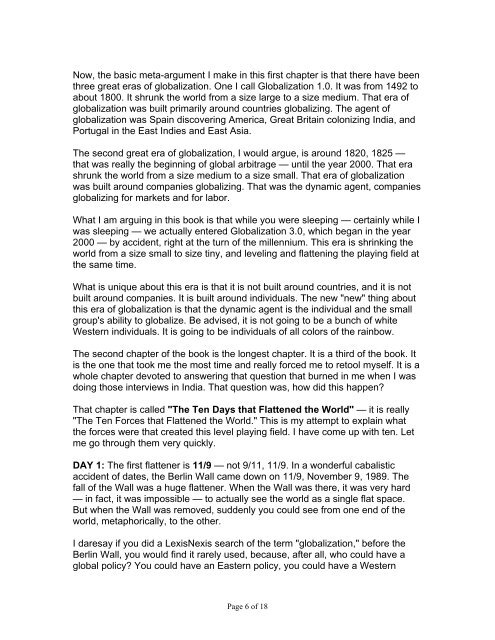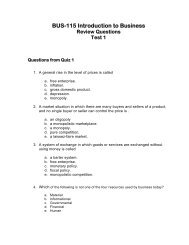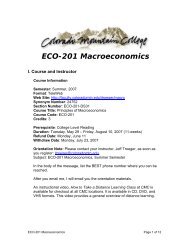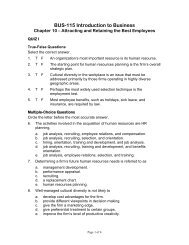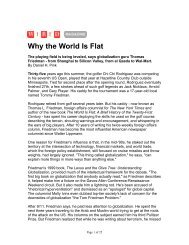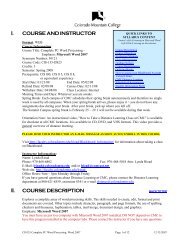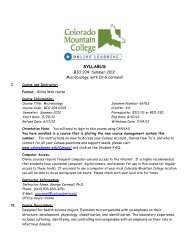The World Is Flat: A Brief History of the Twenty-First Century
The World Is Flat: A Brief History of the Twenty-First Century
The World Is Flat: A Brief History of the Twenty-First Century
You also want an ePaper? Increase the reach of your titles
YUMPU automatically turns print PDFs into web optimized ePapers that Google loves.
Now, <strong>the</strong> basic meta-argument I make in this first chapter is that <strong>the</strong>re have been<br />
three great eras <strong>of</strong> globalization. One I call Globalization 1.0. It was from 1492 to<br />
about 1800. It shrunk <strong>the</strong> world from a size large to a size medium. That era <strong>of</strong><br />
globalization was built primarily around countries globalizing. <strong>The</strong> agent <strong>of</strong><br />
globalization was Spain discovering America, Great Britain colonizing India, and<br />
Portugal in <strong>the</strong> East Indies and East Asia.<br />
<strong>The</strong> second great era <strong>of</strong> globalization, I would argue, is around 1820, 1825 —<br />
that was really <strong>the</strong> beginning <strong>of</strong> global arbitrage — until <strong>the</strong> year 2000. That era<br />
shrunk <strong>the</strong> world from a size medium to a size small. That era <strong>of</strong> globalization<br />
was built around companies globalizing. That was <strong>the</strong> dynamic agent, companies<br />
globalizing for markets and for labor.<br />
What I am arguing in this book is that while you were sleeping — certainly while I<br />
was sleeping — we actually entered Globalization 3.0, which began in <strong>the</strong> year<br />
2000 — by accident, right at <strong>the</strong> turn <strong>of</strong> <strong>the</strong> millennium. This era is shrinking <strong>the</strong><br />
world from a size small to size tiny, and leveling and flattening <strong>the</strong> playing field at<br />
<strong>the</strong> same time.<br />
What is unique about this era is that it is not built around countries, and it is not<br />
built around companies. It is built around individuals. <strong>The</strong> new "new" thing about<br />
this era <strong>of</strong> globalization is that <strong>the</strong> dynamic agent is <strong>the</strong> individual and <strong>the</strong> small<br />
group's ability to globalize. Be advised, it is not going to be a bunch <strong>of</strong> white<br />
Western individuals. It is going to be individuals <strong>of</strong> all colors <strong>of</strong> <strong>the</strong> rainbow.<br />
<strong>The</strong> second chapter <strong>of</strong> <strong>the</strong> book is <strong>the</strong> longest chapter. It is a third <strong>of</strong> <strong>the</strong> book. It<br />
is <strong>the</strong> one that took me <strong>the</strong> most time and really forced me to retool myself. It is a<br />
whole chapter devoted to answering that question that burned in me when I was<br />
doing those interviews in India. That question was, how did this happen<br />
That chapter is called "<strong>The</strong> Ten Days that <strong>Flat</strong>tened <strong>the</strong> <strong>World</strong>" — it is really<br />
"<strong>The</strong> Ten Forces that <strong>Flat</strong>tened <strong>the</strong> <strong>World</strong>." This is my attempt to explain what<br />
<strong>the</strong> forces were that created this level playing field. I have come up with ten. Let<br />
me go through <strong>the</strong>m very quickly.<br />
DAY 1: <strong>The</strong> first flattener is 11/9 — not 9/11, 11/9. In a wonderful cabalistic<br />
accident <strong>of</strong> dates, <strong>the</strong> Berlin Wall came down on 11/9, November 9, 1989. <strong>The</strong><br />
fall <strong>of</strong> <strong>the</strong> Wall was a huge flattener. When <strong>the</strong> Wall was <strong>the</strong>re, it was very hard<br />
— in fact, it was impossible — to actually see <strong>the</strong> world as a single flat space.<br />
But when <strong>the</strong> Wall was removed, suddenly you could see from one end <strong>of</strong> <strong>the</strong><br />
world, metaphorically, to <strong>the</strong> o<strong>the</strong>r.<br />
I daresay if you did a LexisNexis search <strong>of</strong> <strong>the</strong> term "globalization," before <strong>the</strong><br />
Berlin Wall, you would find it rarely used, because, after all, who could have a<br />
global policy You could have an Eastern policy, you could have a Western<br />
Page 6 <strong>of</strong> 18


